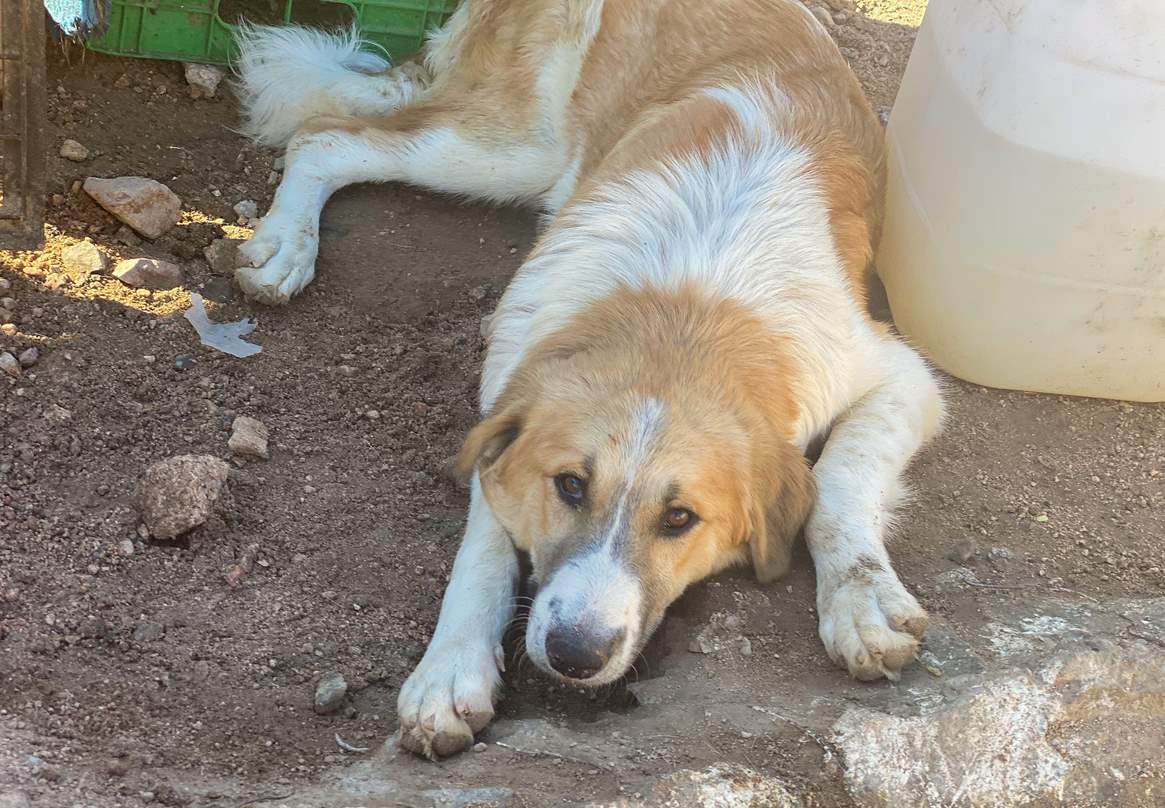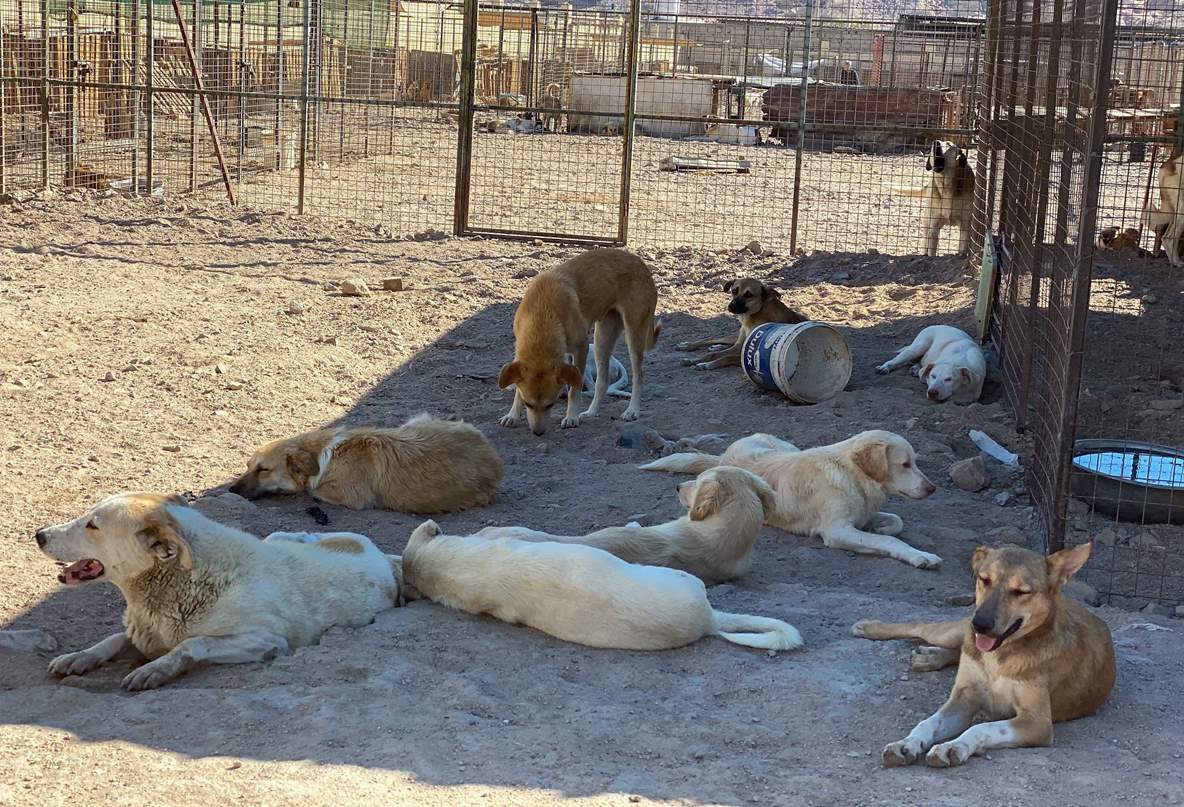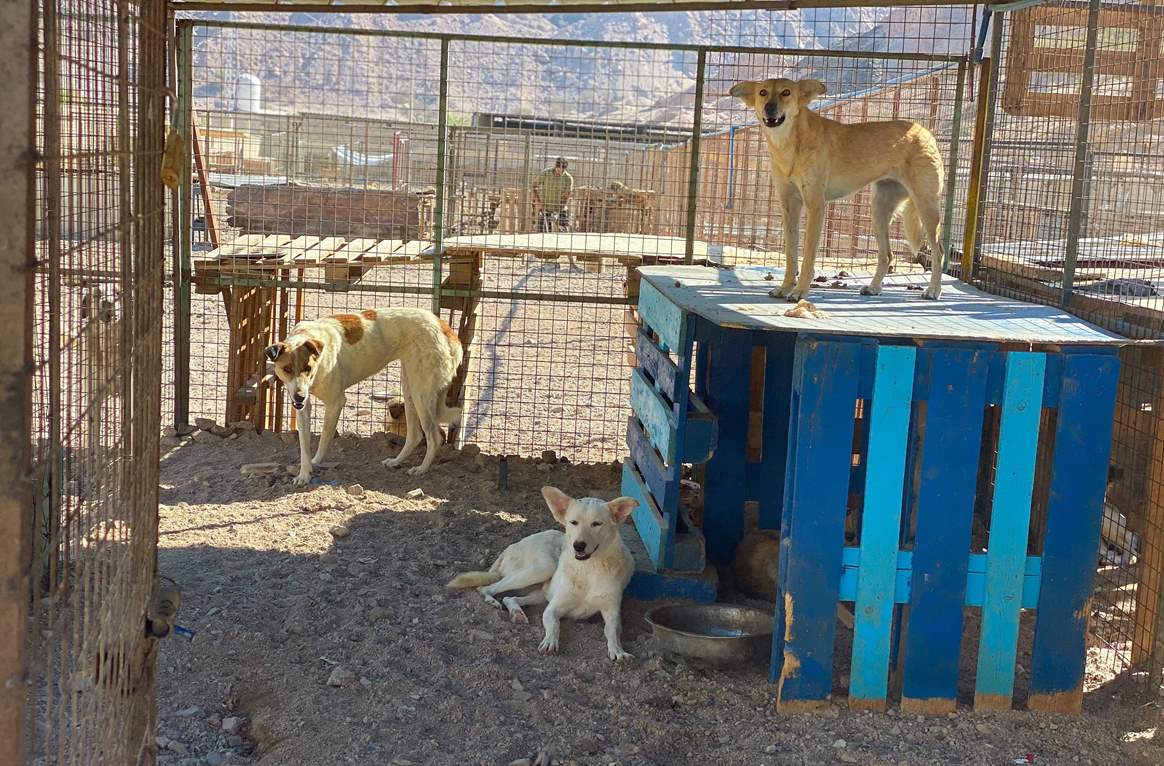AQABA
— There are more than 400 dogs at Al-Rabee Society for Nature and Animal
Protection, and they all want to be your friend.
Walking
into the shelter, located just a 15 minute drive from the center of Aqaba, is a
riot to the senses. Visitors are immediately greeted by a crowd of Canaani dogs,
which are native to the Levant: long-haired, short-haired, brown, grey, white,
orange, they all want to sniff your hand or lick your face.
اضافة اعلان
The
hundreds of dogs at the center are cared for by Rodica Athamneh.
Athamneh
moved to Jordan from Romania over forty years ago. She worked for 18 years and
raised her children in the Kingdom. But during the 2010s, “I didn’t have a job,
and the kids weren’t home anymore, so I had to do something,” she said in an interview
with Jordan News. Her “motherly instinct” was still intact — so she started
another kind of family.
 Zatar is one of over four hundred dogs who call Al Rabee home. (Photo: Zoe Sottile/Jordan News)
Zatar is one of over four hundred dogs who call Al Rabee home. (Photo: Zoe Sottile/Jordan News)
The
shelter started in 2015 with just 20 dogs who were being abused on a public
beach in Aqaba (one of them, a seven-year-old female with short white hair, is
still at Al-Rabee). “It kept on growing and growing. Even now, two days ago we
got a puppy,” she said, adding that the puppy was being hit with rocks by
children in the neighborhood.
As a
cream-colored dog named Lulu rolled over for a belly rub, Athamneh explained
that the non-profit organization relies entirely on donations to feed, house,
and provide medical treatment for its residents.
 The shelter, run entirely by donations and volunteers, has around 45 cages, which host between three and forty dogs each. Lulu is at the far left. (Photo: Zoe Sottile/Jordan News)
The shelter, run entirely by donations and volunteers, has around 45 cages, which host between three and forty dogs each. Lulu is at the far left. (Photo: Zoe Sottile/Jordan News)
The
team cooks around 1,800kg of rice each month for the dogs. They collect chicken
trimmings from local restaurants and hotels to cook with the rice, and buy bags
of dry food for dogs with special needs.
People “don’t know the meaning of a
shelter and why I’m putting so much energy into something that is not
income-generating,” she said. “It’s love-generating. And they don’t realize how
much love you can get. And it’s really worth it, to give this energy to them.”
Growing
up on farms in Romania, Athamneh said that she always loved animals. “We lived
in the countryside. We all have dogs, we all have cats, chickens, geese.”
Athamneh’s
love for animals extends to her own home, which she calls a “small shelter” of
its own. She has 50 cats and 4 dogs of her own.
The Canaanis
“are really sweet,” she said. “They really love people. They’re obedient, and
smart. Everything you want from a dog.”
She
pointed to a few dogs, now large adults with white fur and splotches of brown, whom
she bottle-fed for two months when they were orphaned puppies. “They are really
my babies.”
There
are around 45 cages at the shelter, each of which holds as few as three or as
many as 40 dogs. Athamneh chooses to prioritize puppies, nursing mothers, and
dogs with injuries or that have faced abuse.
 Rodica Athamneh, the executive director of the shelter, coordinates with local vets to provide medical care for all the dogs. Blue tags on the ear indicate which dogs have been spayed or neutered. (Photo: Zoe Sottile/Jordan News)
Rodica Athamneh, the executive director of the shelter, coordinates with local vets to provide medical care for all the dogs. Blue tags on the ear indicate which dogs have been spayed or neutered. (Photo: Zoe Sottile/Jordan News)
Two
vets in Aqaba provide medical care for the dogs. International organizations
like Four Paws, an Austria-based animal welfare organization, visit
periodically to spay and neuter hundreds of dogs as well, though those visits
have been paused due to the pandemic.
Volunteers
clean the cages, dole out water and cook food, and help maintain the facilities
themselves. Tammy, an American from Michigan working in the tourism industry,
volunteers at the shelter six days a week. She told Jordan News that, wishing
for a dog of her own, she had wanted to volunteer for years. But it wasn’t
until the pandemic that she had enough free time to contribute.
Athamneh
explained that for those who complain about stray dogs wandering the streets,
the solution is simple: spay and neuter the dogs and keep dumpsters covered so
the dogs stop scavenging for food.
She
hopes that in the future, Al-Rabee will expand to a larger facility in Aqaba,
where she can separate the animals into separate sections for puppies, dogs in
quarantine, and new dogs.
Dogs of the desert
Bedouin
communities in Jordan, Lebanon, Palestine, and other regions of the Middle East
have relied on Canaani dogs to guard their camps for thousands of years. In the
late 1980s, a mass cemetery containing thousands of dogs similar in build to
modern-day Canaanis were discovered in Israel; the site, dating back to the
fourth century BC, is the largest animal cemetery found to date.
The
dogs have no unified look, though they tend to be mid-sized and have fur in
neutral shades of gold, cream, brown, tan, black, and white.
They’re
a common site on the outskirts of Amman, where they roam the streets scavenging
for food, and in rural areas where they serve as shepherd dogs, corralling
herds of sheep or goats.
Islam
is often cited as the reason dogs are unpopular in Jordan, but religious texts
actually have mixed views on canines. Dogs feature positively in accounts of
the Prophet Mohammad’s life and are not condemned in the Quran.
Several
hadiths urge humans to be kind to animals; one recalls a man blessed because he
gave water to a thirsty dog. But they are thought of as ritually impure in
several schools of Islam, or as guard animals not permitted in the house.
According
to
Alan Mikhail, a professor of history at Yale University, dogs were once thought of as helpful to city
residents in Middle East and kept the streets clean by scavenging. While they
were not often kept as pets due to concerns about cleanliness, they were valued
and treated kindly.
But
around 200 years ago, concerted efforts to get rid of street dogs began in
earnest as they began to be thought of as sources of disease.
Today,
some living in Jordan think of the Canaani dogs as “like vermin. Like garbage,”
said Athamneh. In one episode of abuse, a municipal official was fired
after a video of him shooting a stray dog in
Zarqa went viral in June. She explained that even when loving owners adopt dogs
from her shelter, they are sometimes forced to return them when neighbors
complain or call the police.
Above
all, the dogs at Al-Rabee seem happy: happy to have a bowl of food, to lay in
the shade, and to receive a belly rub.
“At least they are safe here,” said
Athamneh. “We do our best.”
Readers interested in donating to support the shelter can reach out to
[email protected].
Read more
national features





